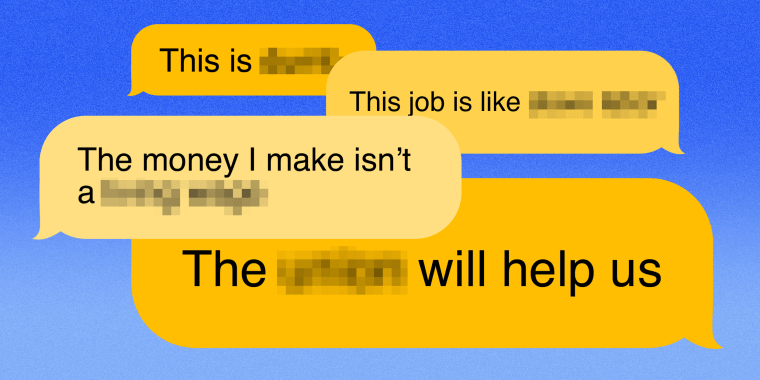The Intercept published a bombshell report this week based on leaked documents revealing that Amazon has been planning an internal messaging app that flags and prevents employees from using a number of words that may signal dissatisfaction, including “pay raise” and “union.” In a particularly dark twist, the list also reportedly includes words like “prison” and “plantation,” suggesting the company is aware of the kinds of harrowing analogies employees might make in describing a highly repressive workplace that, by industry standards, has an extraordinary turnover rate.
News of the program comes on the heels of a major blow to the e-commerce behemoth. Despite Amazon spending millions on anti-union messaging, consulting and surveillance technology, last week a fired Amazon employee successfully led an independent effort to unionize an Amazon warehouse in Staten Island, New York. There is no question that Amazon is now terrified of its warehouses falling like dominoes to unionization efforts and alarmed at the prospect of facing a united effort among employees demanding a safer and fairer workplace.
Amazon is trying to use initiatives ostensibly aimed at employee wellness to divert its workers’ attention from their working conditions.
The fate of the internal messaging social media program — which, according to The Intercept, was slated to be released in a pilot program next month — is unclear. Amazon says the program has not been approved yet, could change significantly and might not be released at all. But regardless of the eventual outcome — which the leaked documents might have already changed — the program should be held up as yet another example of how Amazon is trying to use initiatives ostensibly aimed at employee wellness to divert its workers’ attention from their working conditions and to undermine their efforts to critique or improve it.
Amazon reportedly held a high-level meeting to discuss the app in the fall of 2021. The idea behind it was to allow employees to give one another shout-outs, message one another and to collect virtual badges that reflect their productivity. “The major goal of the program, Amazon’s head of worldwide consumer business, Dave Clark, said,” as reported by The Intercept, “was to reduce employee attrition by fostering happiness among workers — and also productivity.” But there were also concerns expressed at the meeting that the app might allow employees to coalesce around negative feelings toward the company, according to The Intercept. So they came up with a plan to head off that possibility:
Following the meeting, an “auto bad word monitor” was devised, constituting a blacklist that would flag and automatically block employees from sending a message that contains any profane or inappropriate keywords. In addition to profanities, however, the terms include many relevant to organized labor, including “union,” “grievance,” “pay raise,” and “compensation.” Other banned keywords include terms like “ethics,” “unfair,” “slave,” “master,” “freedom,” “diversity,” “injustice,” and “fairness.” Even some phrases like “This is concerning” will be banned.
In response to the article, Amazon said in a statement to The Intercept: “There are no plans for many of the words you’re calling out to be screened. The only kinds of words that may be screened are ones that are offensive or harassing, which is intended to protect our team.” Note that the statement didn’t specify which words it considers offensive or harassing, nor did it deny that any of those words made it into a draft blacklist.
This is all disturbing stuff. A program putatively meant to make people feel better and more productive is in fact also being tested to surveil and manipulate its employees ideologically.
Blocking messages meant to allow employees to think collectively about what might be wrong with their job would compound their alienation. It could also prompt them to associate stigma or shame with the idea of objecting to work conditions.
It’s unclear how the flagging system would work if enacted, but it’s conceivable that a flagged employee might be more closely monitored or more likely to be terminated if marked as a complainer or as union-friendly. This is far from wild speculation: Amazon has invested a great deal of resources to crack down on unions; it tried to monitor their potential emergence and used illegal tactics to suppress their formation. (The Amazon employee who led the successful union effort in Staten Island was fired after staging a walkout to protest unsafe working conditions.)
In light of all this, Amazon’s bid to boost worker “happiness” is better understood as a way to nudge workers away from sharing feelings of unhappiness — and potentially doing something about it.
As I’ve written before, Amazon has a track record of innovation when it comes to crafting new ways to alienate workers. Amazon employees have complained that the working-well huddles, ostensibly intended to promote employee safety, are administered through “infantilizing” and repetitive videos that don’t allow for meaningful interaction or serious instruction. Amazon has deployed booths that resemble port-a-potties to give workers an opportunity to “recharge the internal battery” by taking meditation prompts from a computer. The company, however, seems to show little interest in addressing its overly demanding output requirements, which some data indicates is the primary cause of high injury rates and worker exploitation.
The overarching theme of these wellness programs is to offer a cosmetic solution to worker suffering or a Trojan horse to enhance worker exploitation. If employees begin to unionize en masse, they might see some actual, substantive changes take hold.

